Infinitely Polar Bear is a fairy tale of sorts about mental illness. It recounts the story of a father with bipolar disorder as seen through the eyes of his two young daughters. When Maggie is offered admission to the MBA program at Columbia University in New York City, she invites her husband, Cam, from whom she is separated, to move into her Cambridge, Massachusetts apartment to care for their daughters, Amelia and Faith, full-time. The screenplay is based upon the true-childhood experiences of writer-director Maya Forbes, who characterizes the feature as “a little bit of a living scrapbook.”
Veteran screenwriter Forbes got her start writing comedy as a student for The Harvard Lampoon. A Disney screenwriting fellowship brought her out to Los Angeles, and after just one year, Forbes scored a job as a writer-producer on The Larry Sanders Show. With husband, Wolly Wolodarsky, Forbes has co-authored Hollywood features that have included Monsters and Aliens and Seeing Other People. Additionally, she writes songs with her sister, China Forbes, lead singer of the band Pink Martini. Infinitely Polar Bear marks her formidable directorial debut. Not only is Maya Forbes’s a voice to be reckoned with, the casting of Infinitely Polar Bear is pitch-perfect, and her direction is inventive.
As the eccentric manic-depressive Cam Stuart, Mark Ruffalo mesmerizes as he skillfully pivots a full 180, from riding the crest of a manic flight to drowning in an ocean of depressed sedation. Ruffalo has created an indelible, iconic, and delightful character in Cam — a bipolar Mary Poppins, of sorts. Ruffalo is supported by the luminous and lovely Zoë Saldana, who plays the more grounded and aspirational Maggie Stuart. The young daughters, played by Imogene Wolodarky (the filmmaker’s daughter) and Ashley Aufederheide, have just the right degree of pluck and sweetness.
In this society of ours that is so obsessed with perfection: perfect grades, perfect looks, perfect life, it is refreshing to see a story that embraces people with all their brokenness and humanity. Infinitely Polar Bear models acceptance of mental illness and integration within our ranks of those who are so afflicted. The tone is deeply affecting, and the lingering impression is one of rare decency.
Maya Forbes’s talent is a revelation. I had the pleasure of speaking with her recently at The Fairmont Hotel, San Francisco, about the journey of directing her debut indie feature, Infinitely Polar Bear.
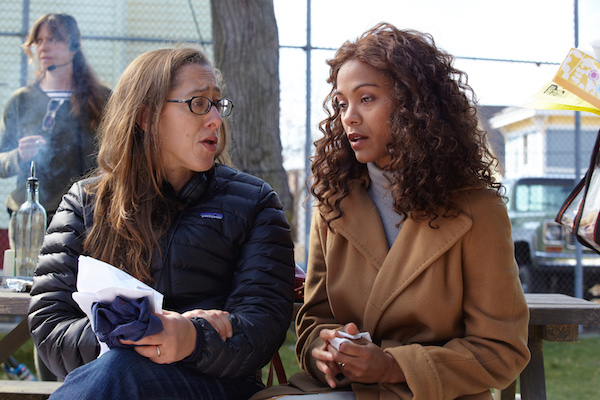
Courtesy of Sony Pictures Classics.
Sophia Stein: I saw the premiere of Infinitely Polar Bear at Sundance 2014, and for me it hit just the right chord. I appreciated that it is a story about mental illness and how those who are afflicted by mental illness are of value to all of us.
Maya Forbes: We love them. They are loved members of our families and our lives.
Sophia: You had been working as a Hollywood writer for fifteen years already, before you set out on the journey to make this film. When did you first imagine Infinitely Polar Bear as an independent feature?
Maya: I probably started writing it ten years ago. I kept writing scenes and then putting it aside, not being able to crack it. I think I was trying to make it too commercial. I was trying to figure out, how do I explain why the kids are left with the dad? When you think of a Hollywood film — it’s always because the mother’s dead, that’s why they live with their dad. But I didn’t want to do that. Ultimately, I thought, I’m just going to try and embrace the truth of why all of this happened. That’s when it started moving into a more independent realm.
So I tried to get rid of all the stuff that I’d learned having written for Hollywood. I tried not to think about “likable.” I’m just going to try and write real and true. Write about the things that happened, try to capture people as they were – which was “not perfect.” People don’t make perfect decisions. Lots of mistakes get made.
I have two little girls, and my husband went away for six weeks to make a movie in India leaving me [alone] with the girls. And it was so hard! “Oh, my God, how did my father do this?!,” I thought. “How did my mother do this, before him?” My girls are basically well-behaved — tough, but pretty well-behaved. But my sister and I, we were angry and feisty. We were not trying to be easy to parent or easy to get along with — we were just pains! Suddenly, I had a whole new level of understanding.

Photo by Seacia Pavao, Courtesy of Sony Pictures Classics.
Sophia: You were just ten years old when your mom told you that she was planning to leave you and your little sister in the care of your bipolar dad. Were you scared?
Maya: We were not scared because we loved our dad. We had seen him have a scary breakdown. In reality that breakdown happened when I was six, and my mom left when I was ten. So there was time when my dad had been pulling himself together. He had his own apartment, and we would go stay with him on the weekends. He always took us to the movies. He was fun, and we loved him, so we weren’t scared of him. He should have been scared of us. [big laugh]
Obviously, as you see in the film, he could lose his temper. I didn’t like driving with him if he got mad at somebody cutting him off. But, it was more like that night in the movie when he comes home drunk, and we would threaten, “We’re going to tell on you. You’re in trouble now. Mom!” We didn’t like it, but we were fighting back.
Sophia: You have said, “I wanted the movie to feel like a memory.” How did you go about achieving that feeling?
Maya: I wanted to make the filmmaking immersive. My DP and I would get together on Sundays and shot-list scenes for the coming week. We started every discussion with: “How is this scene supposed to feel?” — as opposed to, “Where should we put the camera?,” “What are we going to do technically?”
I wanted the film to feel like a vivid, living memory. I didn’t want it to feel faded or distant. I wanted it to be packed with these details so that people would be able to find their own way into the story, some detail that would pull them into their own memories and connect them to their own past. We consciously set out to make a film that would engage on that emotional level.
Sophia: Which elements in your story are most true to the reality you remember, and what liberties did you allow yourself in fictionalizing remembered circumstances?
Maya: The time when Cam brings us to the house where his ancestors had once lived, and it is so embarrassing because he wants to give us a tour — that’s a combination of many, many things that had happened. To tell a story that is coherent and entertaining, the process was one of distillation.
Then there were necessary adjustments: For instance, I couldn’t shoot at South Station in Boston, where we often had picked my mother up when she came in on the train. South Station no longer exists as it once did, and it was too expensive for us to shoot there. This meant we needed [to exercise creative license] in recreating her arrival. In the film, we pick her up at a bus stop. Looking down that long alley is one of my favorite locations. If you had seen to either side of where the camera was pointing, it was covered in graffiti and looks really modern. But just right there, the shot had this wonderful scope.
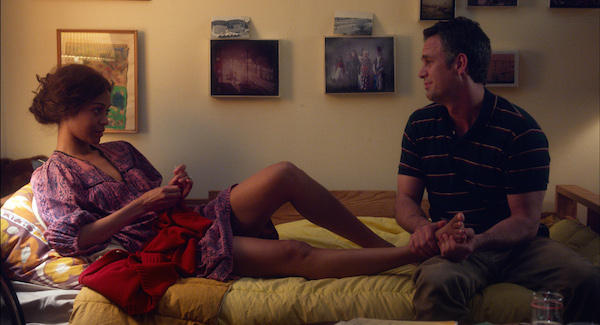
Photo by Bobby Bukowski, Courtesy of Sony Pictures Classics.
Sophia: I became very attached to Maggie and Cam (as portrayed by Saldana and Ruffalo), and I found myself wondering if your parents ever got back together in reality?
Maya: I don’t want to disappoint you, but … We stayed together as a family for a long time, and my parents dated other people sometimes, but they could never really have other relationships because they were so committed to the family. We went on vacations together and spent the Christmas and Thanksgiving holidays together. Then, when I was seventeen, I think my mother probably told my father, “I don’t want to give up on you, but I just can’t keep doing this.” So they did get divorced. I was in boarding school at the time. Right after their divorce, I remember they came up together for a weekend and took me and my friends apple picking. One of my friends commented, “Oh, my God, your parents are so happy,” and I replied, “Oh, they just got divorced.” They stayed really close forever. Until my father’s death. [pancreatic cancer]
Sophia: What do you think your father would make of this film had he been alive to see it? It is such a loving tribute.
Maya: I imagine that he would act very bashful and embarrassed with all the attention. But I think that secretly he would love it. Anytime my sister, who is a singer [China Forbes of Pink Martini] would dedicate a song to him, he would look both completely embarrassed and completely delighted. So, I think that he would feel that way with the movie.
What he really wanted was for us to go out and do things, to be successful in the world in the way that he couldn’t. My sister and I both ended up graduating from the schools that he had gotten kicked out of. I think he felt like, “O.k., I can’t do these things but maybe they can …”
Sophia: Have your mother and your sister seen the film?
Maya: They were at the Sundance premiere at Eccles. That was really something. All my father’s siblings were there, along with my mother and my sister. They felt that it told the truth, that it captured the essence of who my dad was from the child’s perspective.
My grandmother used to say, “He was wonderful but impossible. He was an impossible person.” And he was. He was such a mixed bag. But he was a great dad, in the end.
Sophia: There is that wonderful scene in the film in which Cam’s grandmother, Gaga, offers to gift him her Bentley, which he politely declines. She resolutely refuses his counter-suggestion that she gift them tuition for his daughters to attend private school. She tells him: “I don’t think that’s teaching the girls a very good lesson. Do you?” That just sent shudders down my spine. What do you make of that kind of wealth, coupled with such lack of generosity?
Maya: We were taught never to ask for money. It was o.k. for them to give you something, but you were never supposed to ask. That was just a rule. You weren’t allowed to talk about money. Some people in the family had money, others did not. Maybe the people who had it hadn’t made the money they had. So there was a lot of shame around money.
I think that my great grandmother just really didn’t understand [her son’s illness]. Everyone kind of hoped my dad would get it together, that he would figure himself out and live up to the potential they all thought that he had. No one understood the disease that well. I think my mother did. She understood that he couldn’t handle that kind of pressure. Other people felt like maybe he’s going to pull it off.
Sophia: You are bi-racial. Your parents married in a time well before bi-racial marriage had become more widely accepted. What were some of the challenges you faced navigating the racial divide at that time?
Maya: That’s such an interesting question to me because I didn’t recognize it back then. I lived in Cambridge where we knew many bi-racial couples. I think that maybe if I had looked black, it might have been different – but I didn’t look black.
I have my mom’s family that I love, and my dad’s family that I love. My father’s family loved my mother. My mother’s family loved my father – even while they understood that my dad had some big problems. They loved him because he had many great qualities. They understood that just because you have a serious mental illness, doesn’t mean you can’t be a wonderful person.
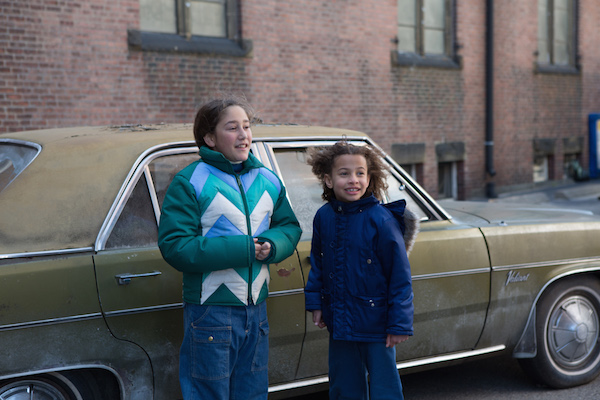
Photo by Seacia Pavao, Courtesy of Sony Pictures Classics.
Sophia: Amelia looks white, but her sister, Faith – looks black, which is fascinating in the context of Rachel Dolezal’s story. How do you identify today?
Maya: I identify as mixed race. At Sundance, my mother said, “Maybe you’re unidentifiably black.”
But I am both. I wish that it was more readily apparent that I was mixed race because that’s what I feel I am. It’s hard not to look like what I am.
It’s such a weird thing. I couldn’t say that I’m white because that would be negating and denying half of my family that I love and feel connected to; at the same time, I couldn’t say that I’m black because that would also be denying half of my family.
I have a cousin on my mom’s side who says, “You know, race is just a social construct. We’re the human race.” I love that, but, of course, so much political and social policy has been driven by race that you can’t be blind to race and racism because it is out there, and you can’t address it and correct it if you are acting like it doesn’t exist.
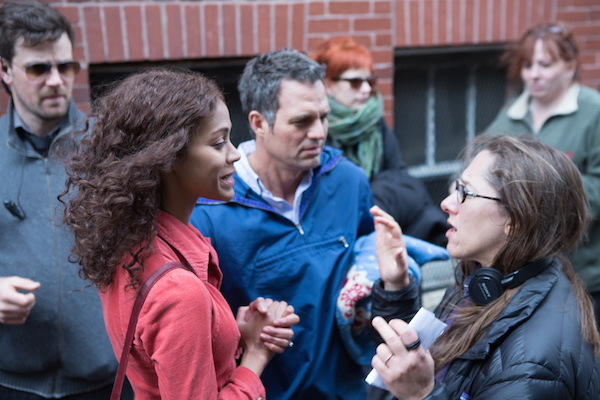
Photo by Seacia Pavao, Courtesy of Sony Pictures Classics.
Sophia: You are a very established screenwriter, but Infinitely Polar Bear marks your directorial debut. You have commented: “While the idea of directing the film scared me, the idea of chickening out scared me more. For my daughters, I had to take this leap.”
Maya: I have always been telling my daughters: “Take creative risks. Don’t be afraid to be the boss. Don’t be afraid to fail. Put yourself out there. Get up in front and be a leader. Sit at the table. Ask the questions. Be out there.” (This is before Lean In.)
And then I felt like if I’m not going to do that, I can’t keep saying this to them. … Because here I have this script, that I thought maybe I could direct myself, but I don’t know … That’s what creative risks are. I have this thing I care about, and I have to follow it through.
So, in the hard moments where it seemed like I was never going to get it together, and I had lost my financing again — that was what kept me going. I had to keep showing my daughters that I could get out there and keep trying to get this made. Maybe I would succeed, or maybe I would fail, but at least they would see that I’m not giving up.
The story is so much about my mother having done that, you know. At some point, I started to reflect, wait, this is what my mother showed me. It wasn’t easy, she worked really hard in a male-dominated industry that was not kind to her, but she did it! She had to make big sacrifices on the family front, but we are o.k.
I knew that directing a movie would be very hard on our family. In some ways, it was. And in other ways, my daughters were completely inspired by the experience. They loved seeing their mother being in charge. They are two little feminists, and they absolutely loved it!
So even though I wasn’t as present as I might have been as a mother while we were making the film, I feel that sometimes rather than focusing on what your kids should be doing, you should be focusing on what you should be doing, what you should be achieving. I feel like my directing the film inspired them. They’re much more go get ‘em now, too.
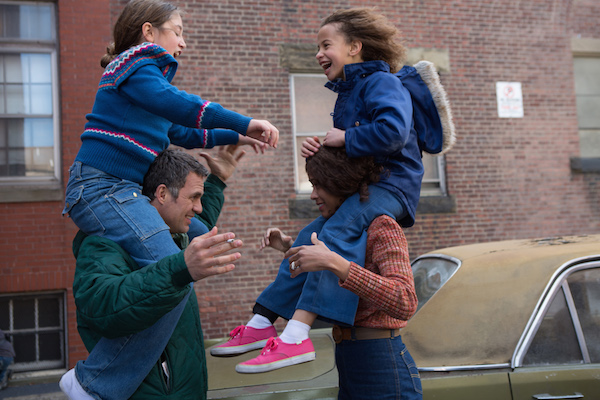
Ashley Aufderheide as Faith Stuart. Photo by Seacia Pavao, Courtesy of Sony Pictures Classics.
Sophia: While I was watching the film, I marveled at your casting of those authentic, resilient little girls. Then I read that Imogene Wolodarsky is your daughter. Did she campaign for the role or was it you who came knocking at her door?
Maya: We had done a reading with Mark and Zoë, for my own elucidation in 2010, when Imogene was nine. Imogene read Amelia, that was like a ninety minute audition, and it was clear that she could do it. My husband and I had been thinking that it would be great for her to play this part. Anytime you’re making an independent film, you just need all the help you can get. It was such a personal movie. It ended up feeling like this is the most personal thing we could do.
Sophia: Did she just dive into and say, “Absolutely, mom. I’m in.”?
Maya: She had not a second of hesitation. She totally wanted to do it. Imogene attacked that role. I think my financiers and producer were worried that I was going to be this mother who thought everything my daughter did was just genius. “Don’t worry,” I reassured them, “It’s not going to be like that.” In fact, I was hard on her.
Sophia: How does Imogene remind you of yourself at her age?
Maya: She’s really emotional and a little bit volatile, as I was at her age.
Sophia: In her bio, I learned that Imogene is the founding member of the Friendly Fifth Graders, whose mission is to help younger kids who look lonely or scared on the playground. Was that something you guys cooked up together?
Maya: No, she did it herself. She ran for school president. She wrote the speech. I had nothing to do with it. I could never have written a speech the way she did. She speaks and she writes right from the heart. I thought, wow, how did you learn to do that at such a young age? It’s amazing. Imogene was in two shows this year at her school, but we are encouraging her to write and direct, as well – because if she could do the whole thing, why not?
Sophia: How did you approach casting Ashley Aufderheide, who plays the younger sister, Faith?
Maya: I had wonderful casting people, Doug Aibel and his associates. We found Ashley right before we started shooting. She went on tape in New York with some great answers to questions. “What kind of animal are you?” [in a sassy whisper] “I’m a tiger,” she answered. She just had a fierceness that I really responded to. She and Imogene seemed like sisters; they really clicked. My daughter was very familiar with this world, but to bring another little kid into all of it — it has some heavy themes. Ashley was a really smart eight year old.
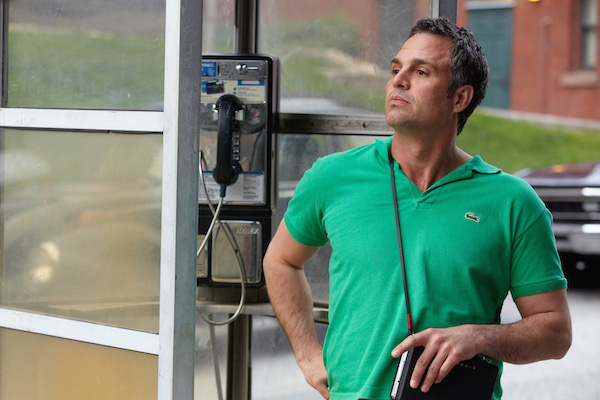
Sophia: Mark Ruffalo’s transformation from the opening scene where we see him in a manic flight, cut to the hospital where he is so heavily medicated — that is a tour de force opening. Ruffalo is clearly at the top of his game. He has created this indelible, iconic, delightful character in Cam. How did you work with him to shape such a brilliant performance?
Maya: Thank you, I totally agree. Mark Ruffalo is amazing. Mark was attached in 2010. We met right after The Kids Are All Right. J.J. Abrams had sent the script to him through Mark’s manager – who, coincidentally, was a friend of mine from college. So that was helpful. Mark and I clicked creatively. The good thing about having years and years where we couldn’t get the financing, there was a lot of time for this stuff to percolate. I gave Mark some videos of my father, and some Super 8 film that my father had shot of himself when he was manic. The opening shot where Cam is looking directly into the camera, those are ripped right from my father’s own manic movies – “his manic oeuvre.”
“You have to carry yourself differently than usual,” I suggested. “Often you play one of these guys [who are hunched forward] like this, whereas Cam is chest up. Bearing.” “Cam was raised to think that he was going to inherit lots of money, as if he were king of the world,” I explained. “So this is how he carries himself, even though he doesn’t feel that way inside.“ “You’re going to learn how to tie a bow-tie without looking in the mirror,” I told him. It’s almost like I wanted Mark to go to finishing school. We talked about diction. “You’re going to enunciate,” I explained. “You’re going to savor the words.” Mark loves words too, and he uses fun words. So we’d get together periodically, when I was in New York. We did the table read, we talked about stuff. Six months would pass, we’d get together again. I was looking for the money, desperate to hold onto Mark and Zoë. It’s just so hard to hold onto people sometimes, but they were very committed to this project.
When we got to the set, I didn’t want Mark carrying something that wasn’t honest. “Just bring yourself,” I told him, “be yourself.” I feel like that was the critical thing that made it feel very natural.
There was this one scene, where Cam was picking Maggie up at the bus station, and I said, “She’s going to come out through the fence and you’re going to just sit there in the car.“ “I would get out of the car,” he said. I was just thinking of making my day and getting the shot off. “No, no, just sit in the car.” “No. Cam would get out and carry her bag,” Mark objected. “I would never sit in the car and watch her coming. I would always get out and carry the bag.” And I realized, he was right … because Cam was a gentleman. And so was Mark Ruffalo. Mark had a lot in common with my father — the tinkering and all the stuff that he does.
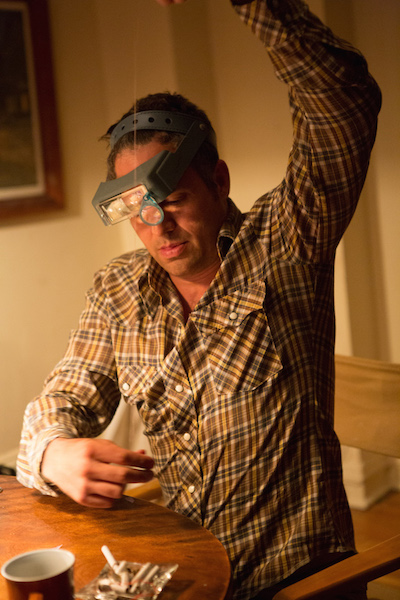
Courtesy of Sony Pictures Classics.
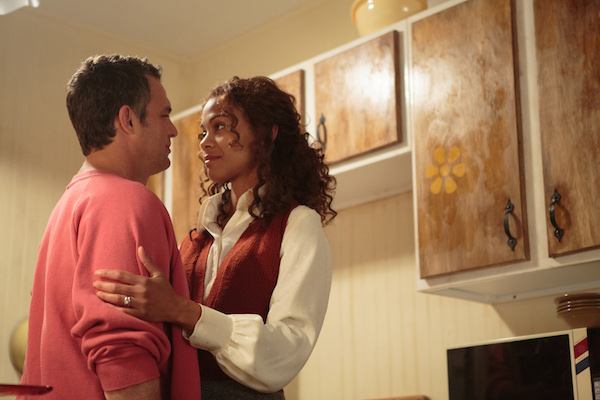
Photo by Seacia Pavao, Courtesy of Sony Pictures Classics.
Sophia: Zoë Saldana strikes just the right note of compassion combined with ambition. What was it that steered you in her direction?
Maya: It was the fact that I knew that Zoë would play this role not from a sad place. She understood the sacrifices that she was making, but she was an optimistic person – full of a sense that she could improve her own and her children’s lives. She just had that vitality. I didn’t want it to feel like, “Oh this poor woman.” Obviously, Maggie is going through a really sad time, but she’s not a sad person.
Sophia: In 2013, you were selected as one of Variety’s 10 Directors to Watch. Have you taken the bait? Are you committed to the path of directing?
Maya: Absolutely. I gotta get another picture. I gotta figure it out though. They say that it is harder for women on their second project. Have you heard that?
Sophia: I have heard that. But, we don’t have to listen to that.
Maya: I’m not gonna. I’m just gonna keep going. I feel good. I know I can do it.
Sophia: I heard Jack Black’s name tossed around …
Maya: My husband and I have written a movie for Jack Black. It’s based on a true life story of this guy who emigrated to the United States from Poland in the 70s. He became the Polka King of Pennsylvania, with this polka orchestra and these flamboyant, bedazzled suits. He was a funny singer-dancer, but he also ran a Ponzi scheme. It’s about the American dream. It’s very fun.
Sophia: I appreciate that you didn’t dwell in the depressive quality of bipolar disorder, that Infinitely Polar Bear has a lighter touch. It feels to me like a fairy tale with a dark under-belly. I love that treatment of mental illness.
Maya: It’s funny because I think some people who see Infinitely Polar Bear may react, “Oh, you’re telling a story that is too light.”
My dad had serious problems. His daughters walk away from him at the end of the film, and he’s alone. It’s not like it’s a super-happy ending for him. But he did a good job raising his kids, and that means that his daughters are going to go off and be independent — which is heart-breaking. Because by succeeding, he will lose them.
Top Image: Mark Ruffalo as Cam Stuart, Imogene Wolodarsky as Amelia Stuart and Ashley Aufderheide as Faith Stuart. Photo by Claire Folger, Courtesy of Sony Pictures Classics.
